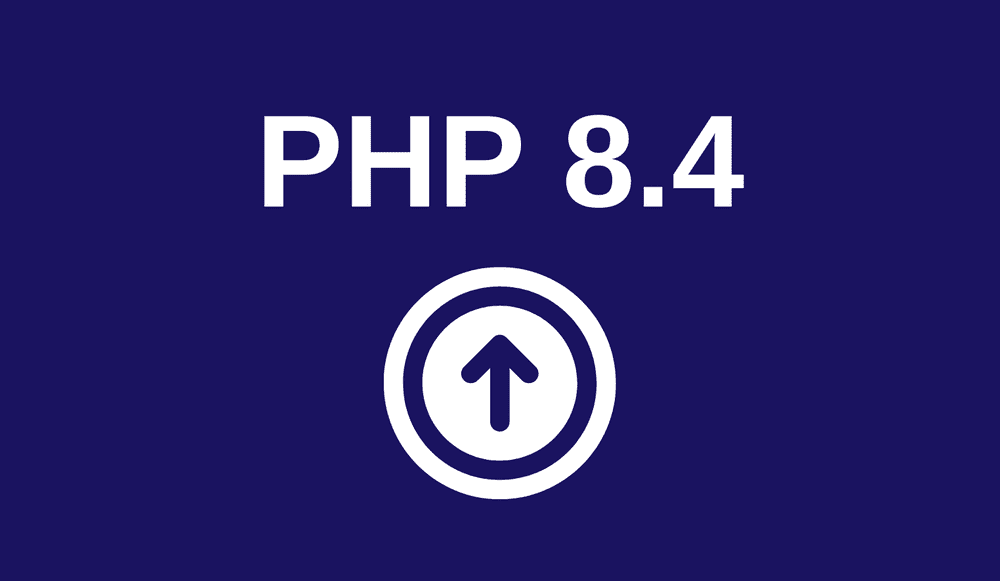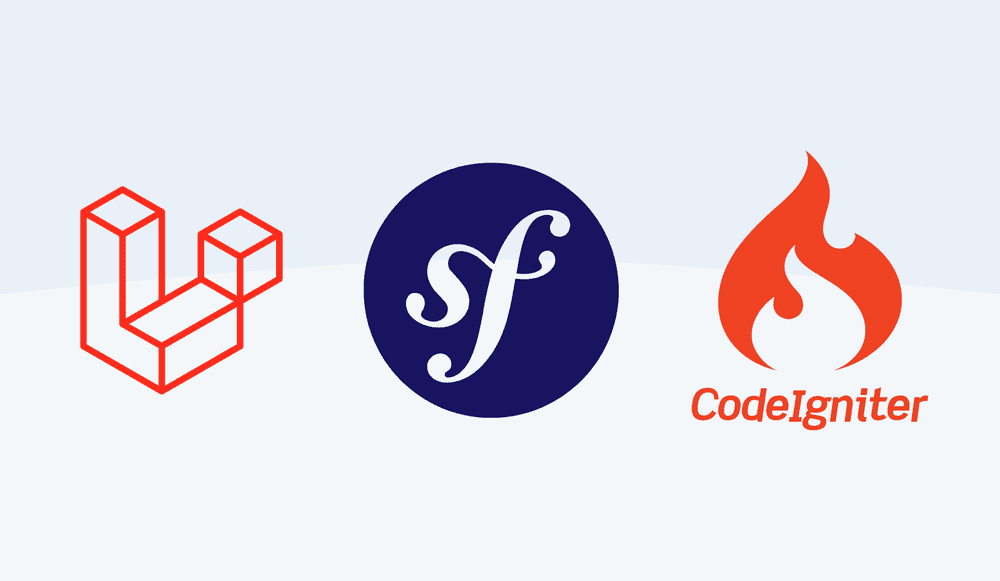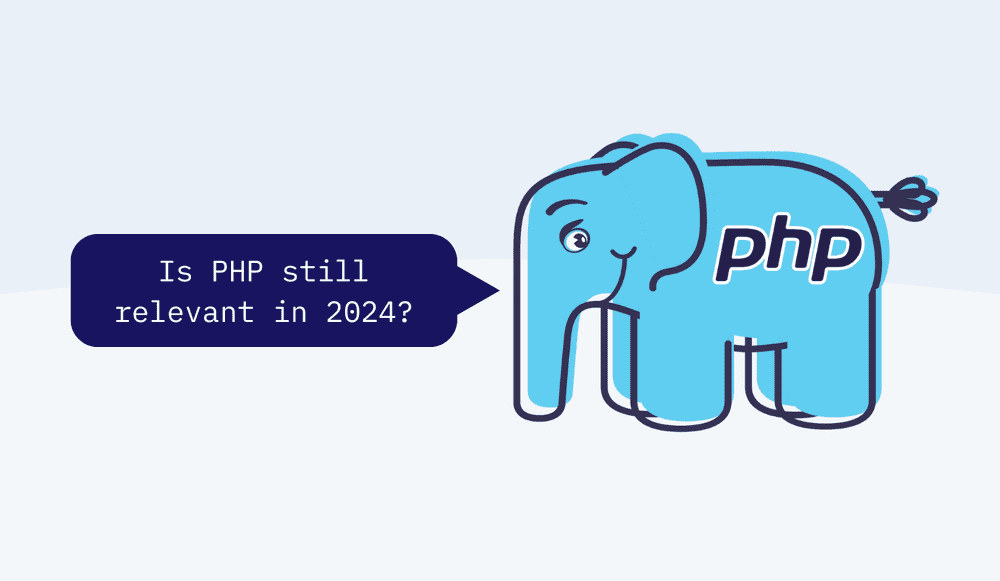Is PHP still relevant in 2025?
Yes, it is. Period. End of article 😉 Source: isphpstillrelevant.com
And now let's be more serious. The same question is being asked over and over again. Moreover, I asked myself the same question last year and did some research which resulted in this article. This year, I decided to dive even deeper and review over a dozen different reports on the development ecosystem, to find the best answer possible.
But why ask the very same question in 2025? Because this year is pretty special for PHP:
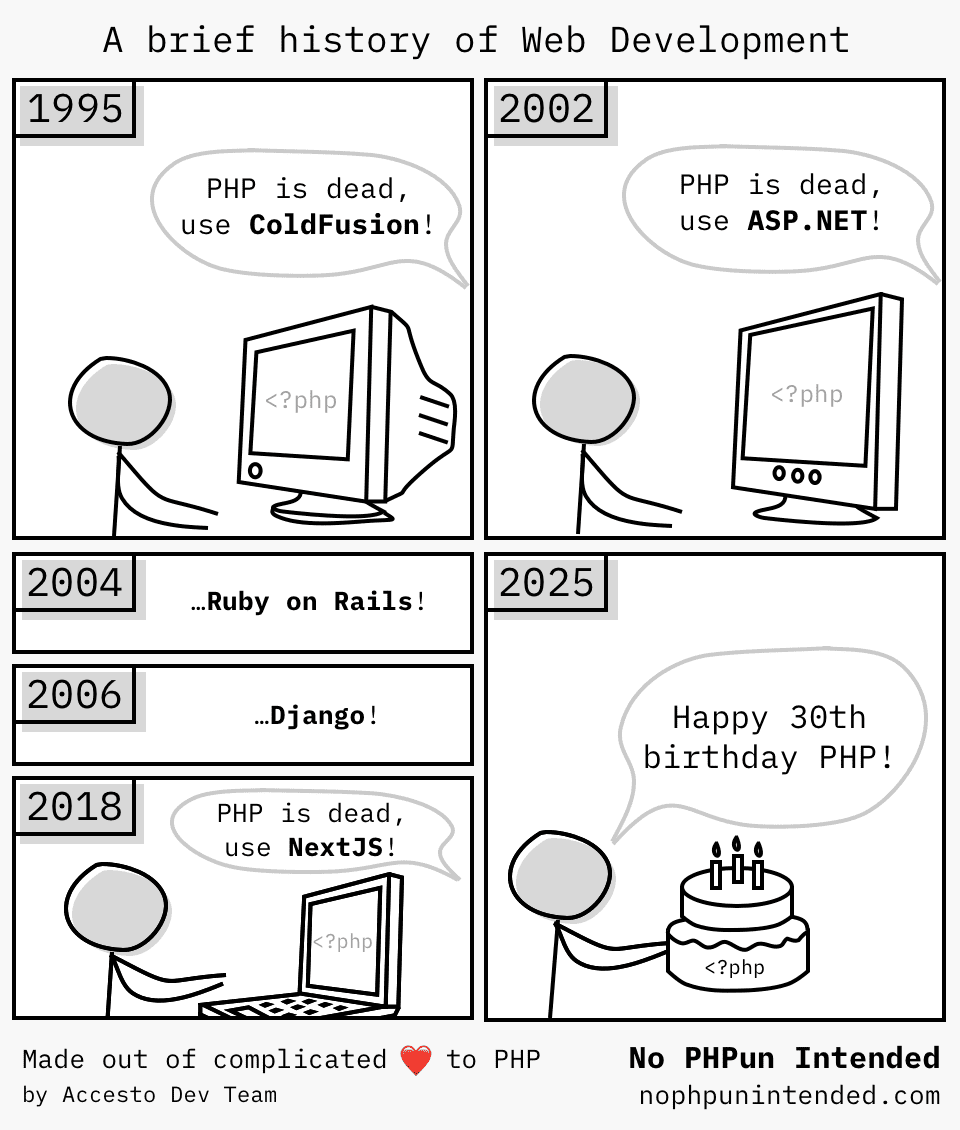
Yes. This year PHP enters its thirties 🎉 On this occasion I recently wrote an article that briefly summarises the history of PHP web development. It is worth reading that article because PHP history also helps to understand the present and the future of this programming language. But if you are in a hurry, here are my top 4 lessons learned...
What we can learn from PHP history?
Before we examine PHP's role in 2025, let's consider what we can learn from its history and how it impacts today.
- PHP, as a programming language, was rarely the first one to introduce any coding innovations. It was never a hype-driven language, but it always followed the industry and adapted solutions that proved their value in other technologies.
- Although it has been 30 years of constant development, PHP is not a finished story. It continues to grow delivering new features and performance improvements with each version. Just recently we have noticed a 20% performance boost after upgrading one of the projects from PHP v8.1 to v8.4.
- PHP was created by Rasmus Lerdorf to solve his real-life problem. And for years it continued to evolve in that very manner — driven by real needs, not by hype. And recently The PHP Foundation emerged to ensure its growth in this very manner.
- Last but not least — PHP was never meant to be a one-size-fits-all technology. Unlike many other languages, it is not an all-purpose language, you won't find it everywhere. But it serves very well in the areas it was meant to be used, which is — the backend of the websites, web applications and APIs.
This last observation was also one of my conclusions from the last year's article "Is PHP still relevant in 2024?". Although the percentage of developers using PHP dropped to around 20%, it doesn't mean that fewer developers use PHP. It means that nowadays there are way more developers, and different kinds of developers than in the past. Fine, PHP may just have 20% of the cake, but it is now way bigger cake than ever before.

Software development "cake" is now bigger than ever and has many more flavors.
And thanks to its rock-solid and mature frameworks (like Symfony and Laravel) PHP still has an important role to play in modern web development. And TBH, if I were to start a new SaaS-type web app now, I would still select PHP as a main backend technology. Does it make PHP still relevant? Maybe... but let's be more objective and base the answer on facts and figures instead of opinions.
Back to today — is PHP still relevant in 2025?
In my last year's post, I mentioned the famous statistic that PHP powers around 75% of all the web. This number slightly decreased from 76.5% to 74.5% during the course of 2024 (source: w3Tech). Does it matter? Well, yes... and no. Yes, because it does show some small but constant decrease. And no, because IMO this number has never made much sense!
Or maybe it did, but a long time ago, in times when dynamic web pages were a number one hype phrase. This number was always WordPress-driven, and WordPress is quite far from being the PHP state-of-the-art tool. And languages like PHP stopped being used only for website development decades ago.
What's more, the same source shows that jQuery is by far the most popular JavaScript library. Does this anyhow explain the place of JavaScript in today's web development landscape? Nope. Yet, some people still use numbers provided by w3Tech to highlight that PHP remains a dominant language for web development. So, what's the better source?
Data sources for meta-analysis
How we can better measure the relevance of PHP in the modern developer ecosystem? Actually, there are a couple of good studies and reports that allowed me to do some meta-analysis.

Various reports used to see if PHP is still relevant in 2025.
State of Developer Ecosystem Report by JetBrains
Personally, I really value the work done by the authors of the State of Developer Ecosystem Report 2024. JetBrains, thanks to the IDEs they build, have a great and direct access to programmers coding in various languages and using different technologies. Their researchers surveyed over 23 thousand (!) developers around the world. State of Developer Ecosystem was a pretty in-depth research not only about software development tools and programming languages but also a job market trends, developer experience and stuff like AI adoption in the development process. Kudos for that!
Stack Overflow Developer Survey
Stack Overflow did even larger research than JetBrains, surveying over 65K developers from 185 countries (but not all of them answered all the questions). In their 2024 Developer Survey, they covered similar topics as JetBrains, but additionally separated the answers of professional developers from those still learning to code. This helps to spot differences between what's now relevant to programmers with commercial experience and what may be relevant soon when newcomers enter the market.
IEEE Spectrum Top Programming Languages Ranking
IEEE is probably one of the world's largest technical professional organizations. They claim to produce over 30% of the world's literature in the electrical, electronics, and computer engineering fields, with around 200 peer-reviewed journals and magazines. Their Spectrum Ranking on Top Programming Languages introduces a complex popularity ranking that looks at different aspects of popularity:
- languages in active use among typical IEEE members and working software engineers;
- languages that are in demand by employers;
- and languages that are trending.
They use and process data points from various channels and mediums like: Google search (number of results and trends), Stack Overflow, IEEE Xplore Digital Library, CareerBuilder site, GitHub, Trinity College Dublin Library, Discord. Each data source generates metrics that are then normalized to produce a relative popularity score between 0 and 1. Then the individual metrics are multiplied by a weight factor, combined, and the result is renormalized to produce an aggregate popularity score. May sound complicated, but don't worry! All we need to know is that eventually, they provide a simple 0-1 popularity score for each programming language.
GitHub Octoverse Report
GitHub could not be missing among those who summarize the state of the software development industry. Their Octoverse report is based on data from Git repositories they host. They analyze things like the number of repos, contributors, pull requests etc. Although Octoverse is not as detailed as reports from JetBrains or Stack Overflow, it is extremely popular, in my opinion, due to its straightforward conclusions and easy-to-share charts. Their main insight in the recent report was that AI leads Python to the top language spot. And what about PHP? Bear with me, we will get there.
Zend's 2025 PHP Landscape Report
Last but not least from those who can tell us a bit more about the role of PHP in web development is Zend of course. Their PHP Landscape Report is solely focused on PHP development, so you won't find there any comparisons of popularity or so. But it gives a lot of insights on who uses PHP and how.
IT Contracting Salary Guide 2025 by Hays and... many other salary reports
There are many salary guides that compare the wages of software developers using different programming languages. Such comparisons may also be an indicator of how relevant particular technologies are. Unfortunately, after reviewing many of them, I must say that it is extremely difficult to compare the salaries consistently. Different definitions of seniority, different markets/countries or branches, contract types, and even different definitions of job roles (PHP developer, web developer, webmaster, WordPress developer) make it all very inconsistent and non-comparable.
Even focusing on a particular job market (US) gave me results from $69,000 to $118,000 as a median salary for a regular PHP developer. According to some websites (like indeed.com) Python developers earn way less than PHP developers, on other (payscale.com) it is the opposite way around. And according to glassdoor.com — Python and PHP developers get similar wages.
So instead of comparing a number of sources I am unable to verify, I decided to focus on my own job market in Poland. This allowed me to compare the numbers with my own experience, and confirm they are sensible. I selected IT Contracting Salary Guide 2025 by Hays Poland as it is one of the most comprehensive studies for the IT industry in my home country, summarizing salary data from almost 15,000 IT contractors.
Ok, so that's it about the data sources. Before we jump into answering our main questions, let's see what we define as "being relevant" for a programming language.
What does it mean for a programming language to be relevant?
Probably everyone will have their answer to that, and something relevant for one programmer may not be relevant for another one. So instead of arguing what this actually means, let's have a look at this topic from four different perspectives.
Are developers using PHP language?
- Compared to other languages, how popular is PHP nowadays?
- How many developers actively use it?
Will developers use PHP in the upcoming years?
- Is PHP worth learning?
- Will there be jobs for PHP developers?
- Will it be used in the upcoming years?
Does PHP do its job well?
- Is PHP useful in some types of development?
- Is there a niche in which it excels?
Is PHP as a programming language itself being actively developed?
- How big is the community?
- Who is supporting PHP?
- Is it updated regularly?
- Do we get any new stuff?
And now, let's try to answer all of those...
What do the reports say about the relevance of PHP?
Are developers using PHP language?
According to the State of Developer Ecosystem Report — around 17% of all surveyed developers have used PHP in the last 12 months. It is approximately the same number as C and Go — although each of these languages has a completely different story behind them.
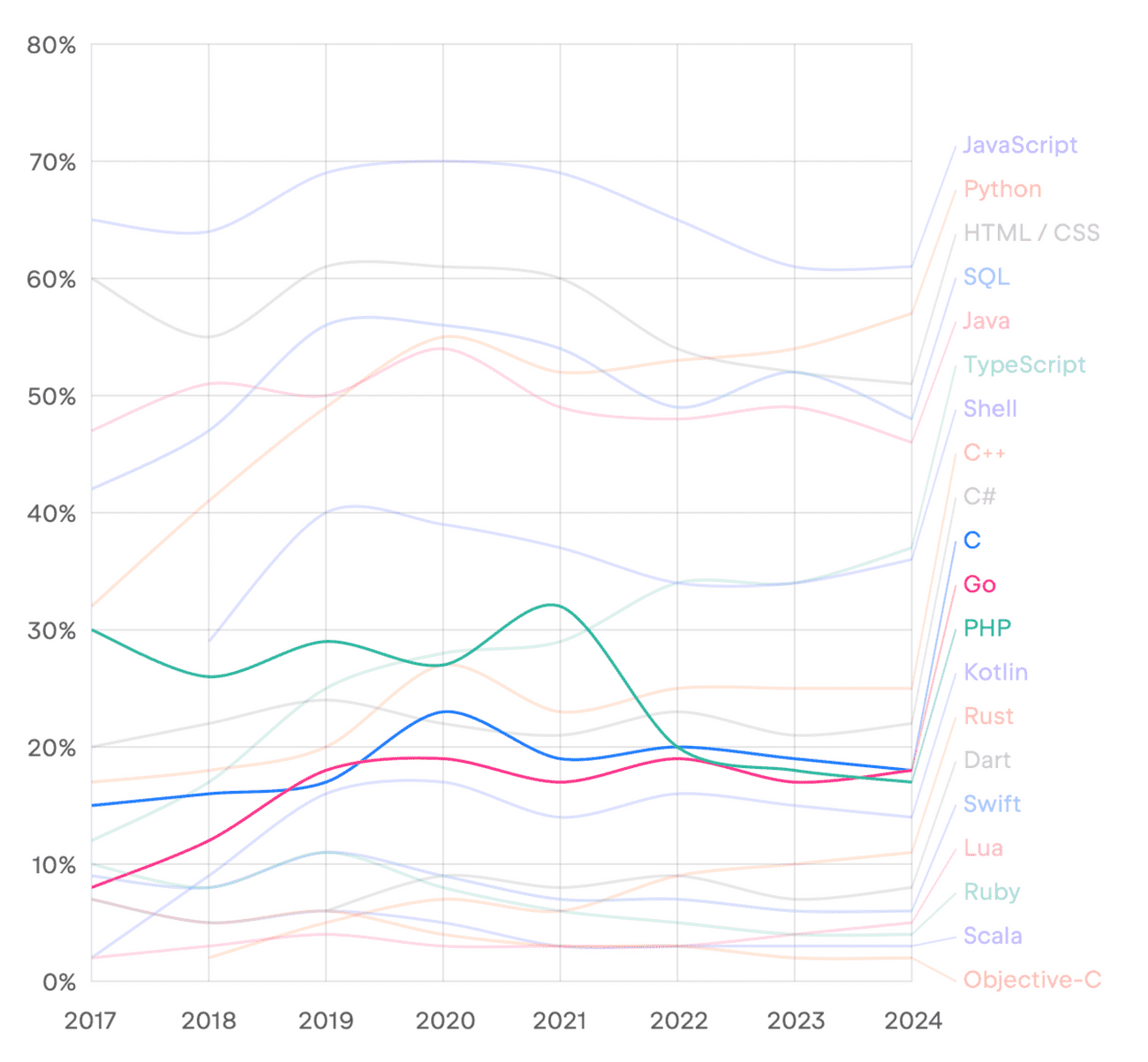
JetBrains: Which programming languages have you used in the last 12 months?
A report by Stack Overflow shows a similar 18% result for PHP. Worth mentioning though, that results for Go and C are a bit different from those reported by JetBrains. Nevertheless, based on these two sources combined we can say that around 17-18% of all developers use PHP to some degree.
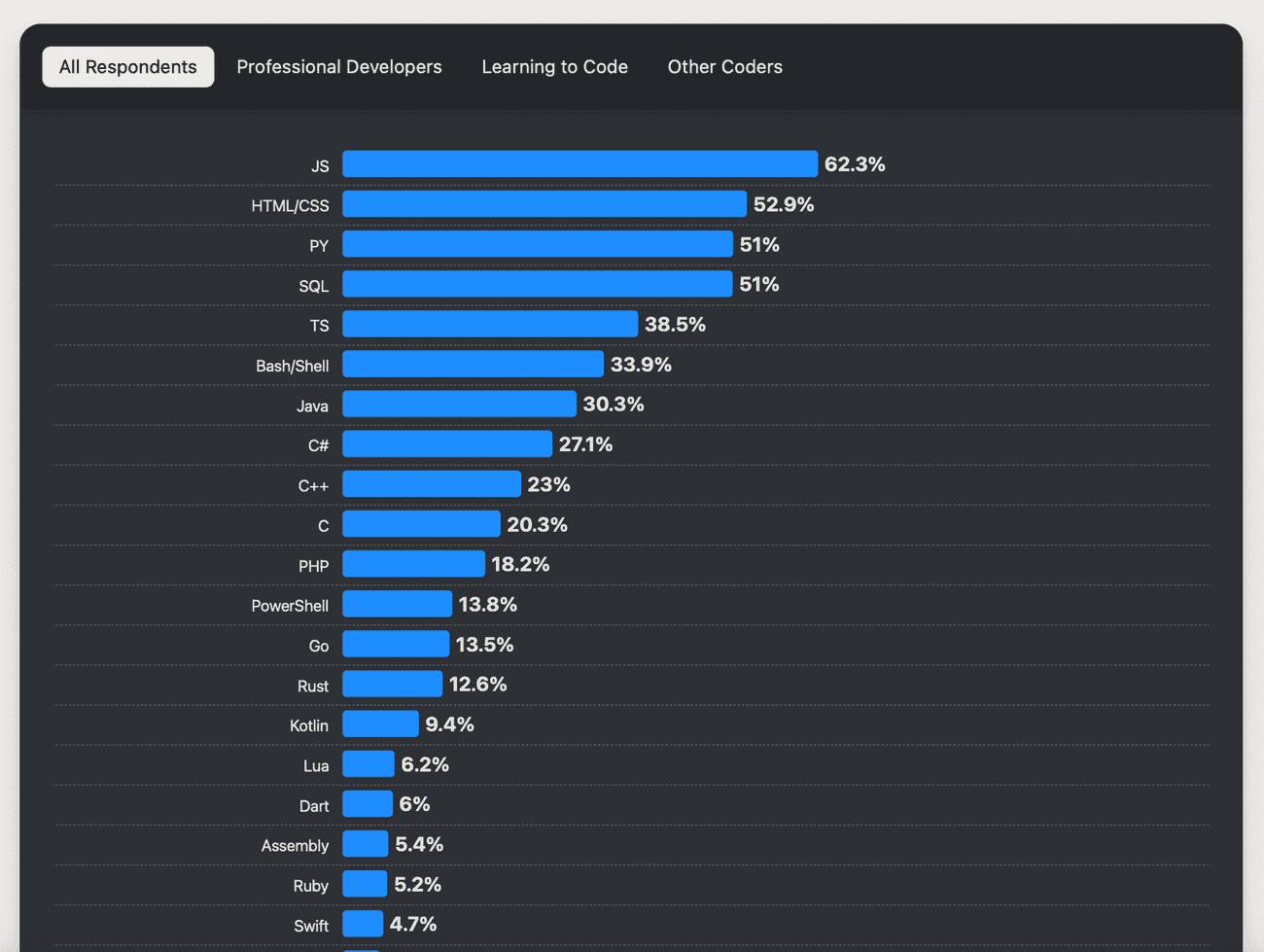
Stack Overflow: Which programming languages have you done extensive development work in over the past year?
Does this 17-18% make PHP relevant? It places PHP outside the top 10 most popular programming languages. With a big drop from the 6th position around 2021 when PHP was used by around 30% of developers. But don't conclude too quickly! Let's dive a bit deeper and have a look at another chart from the Stack Overflow report:
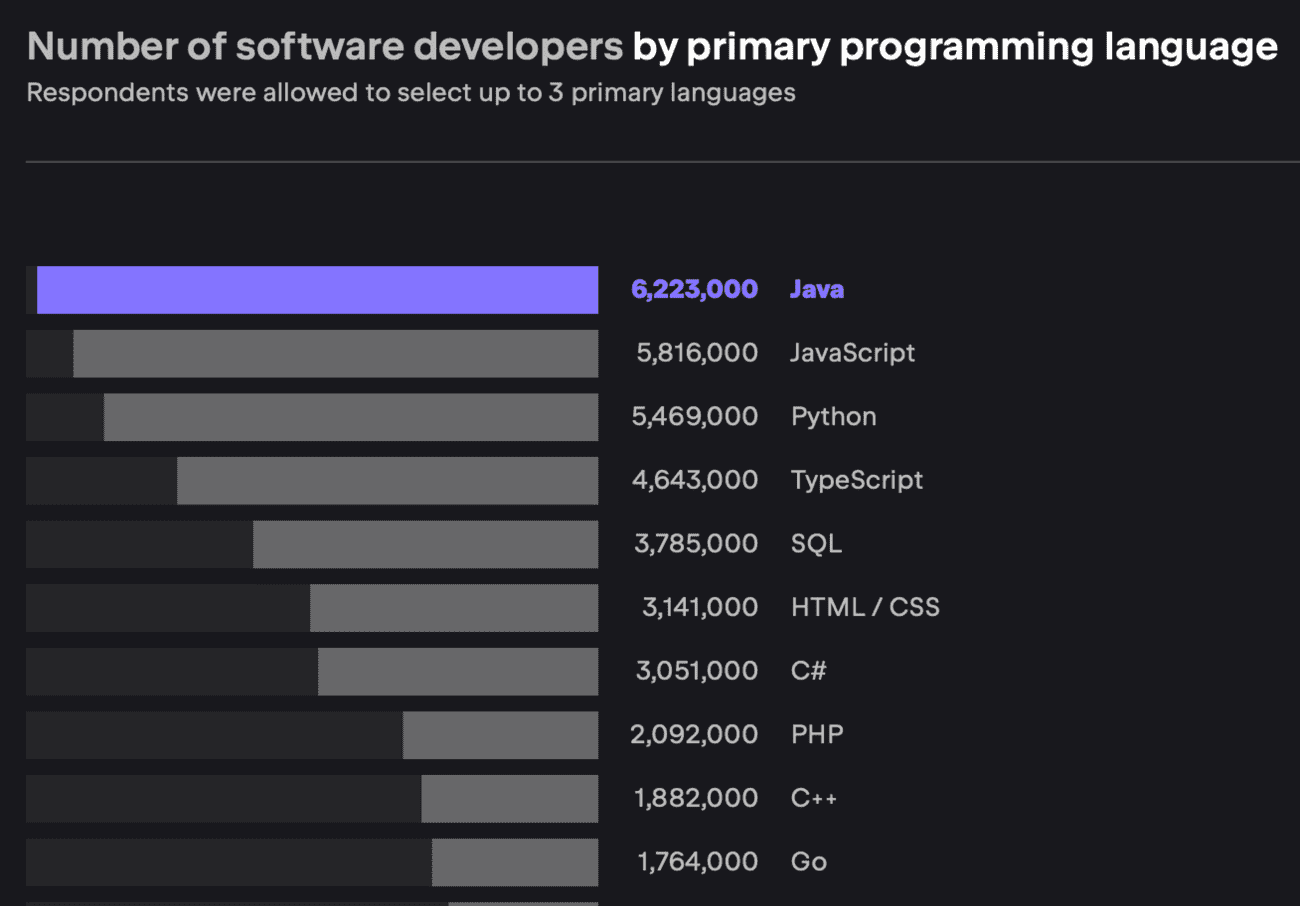
Stack Overflow: Number of software developers by primary programming language.
The same report, the same year, same respondents — and PHP ranks #8 among all the programming languages. What's different? In this question, developers were asked to indicate their primary programming language, while the previous survey just checked whether they used the language at all in the last 12 months. This changes a perspective, using language from time to time for some side jobs (eg. writing some shell script) is a completely different story from using it daily as your core technology. From this perspective, PHP is among the most popular programming languages with over 2 million developers worldwide. Maybe not the most popular, but far from being a dead language.
Yet another perspective is presented by GitHub's Octoverse report. It is probably one of the most frequently shared charts recently, that illustrates programming languages' popularity. Many seeing this report concluded that a doomsday for PHP is coming. Personally, I have a couple of objections against this chart, but that's for later. Let's first analyze it:

Top programming languages on GitHub by distinct contributors to projects.
GitHub's Octoverse report shows a way longer time perspective than two previous reports — giving us a timeline for a decade of software development. Regarding PHP, two things become apparent. First of all, PHP again got into the top 10 👏 placed in the 7th position, so even better than indicated by Stack Overflow. However the complete list of technologies taken into account differs between these two reports, so it is not a simple comparison. Secondly, yes, PHP was losing its position in the ranking year by year, falling from place #3 a decade ago. It may look very pessimistic for PHP developers, but again, let's not draw any conclusions too quickly!
If we analyze this chart together with the previous one, we will notice that PHP and C++ have almost identical popularity. The exact number of developers may and will differ in each research, but these are more or less the same for both languages. So I would rather say that since 2020 these ranked the same.
Another thing worth mentioning is that such reports tend to treat JavaScript and TypeScript as two separate languages. Although this approach helps to understand trends between these two, it makes it difficult to compare them against other technologies. Although developers may have preferences between JavaScript and TypeScript — it is still the same language group. Many even say that TypeScript is a superset of JavaScript, which isn't 100% correct, but still, it shows that they are more like a flavor, rather than a separate technology. And that's one of the reasons why I don't like the last Octoverse report. Its main conclusion was that Python gets to #1 now. But actually, when you check the numbers and combine TypeScript and JavaScript users, these are a way bigger group than Python developers. Python is indeed rapidly gaining popularity because it is broadly used in many AI solutions, but it is still far behind JS/TS stack.
Taking the above considerations into account, if I were to combine the rankings of top programming languages for 2025, it would look like this:
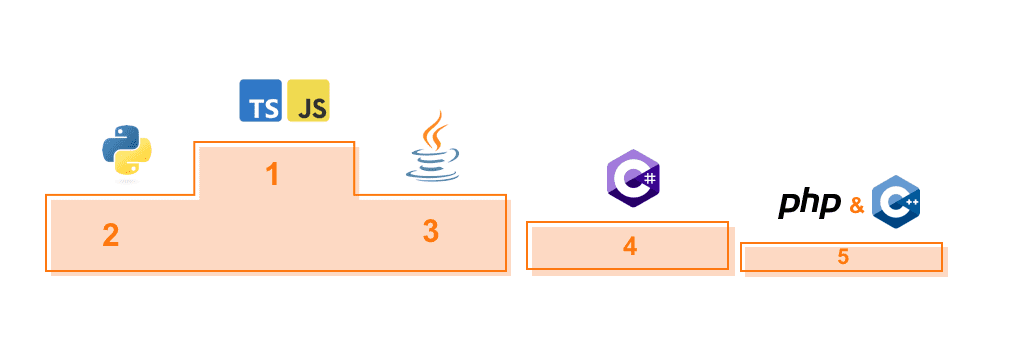
Combined ranking of top programming languages.
And it is more or less a stable list for the last 5 years. And in the longer, 10 years perspective, only true change in rankings was the increase of C# popularity. But will it stay like that in the upcoming years? Will developers use PHP in the upcoming years? Or will the descent of PHP highlighted in Octoverse report become a reality? Let's see...
Will developers use PHP in the upcoming years?
How to foresee the popularity of the programming language without a crystal ball? Actually, there are a few options. None of them will be a guarantee, but all will at least give us some directions. So let's get back to our reports.

Stack Overflow: the popularity of programming languages among people learning to code.
We have a famous sentence in Poland that can be translated to "Our future will be what our youth receives in education". And this may be also one of the ways to assess the future of a programming language. The more people learn it, the higher the probability that it will be used in the future. Again, not a guarantee of course, but at least some indicator.
According to Stack Overflow's report, around 15% of the people learning to code have extensively used PHP in the last 12 months. This won't make PHP climb in the rankings, for sure. But we can also notice that the Go language which could potentially take over the role of PHP is much less popular among newcomers. The popularity of C and Rust may surprise, but these are low-level programming languages and are extensively used during studies at the universities and shouldn't be seen as a potential replacement for PHP. So from that point of view, the position of PHP seems to be solid for the next couple of years.
When it comes to Rust, Roman Pronskiy revealed in his last interview with our CTO that The PHP Foundation is working on making it possible to write PHP extensions in Rust instead of only C. So we may soon notice a nice collab between PHP and Rust — looking forward to 😉.
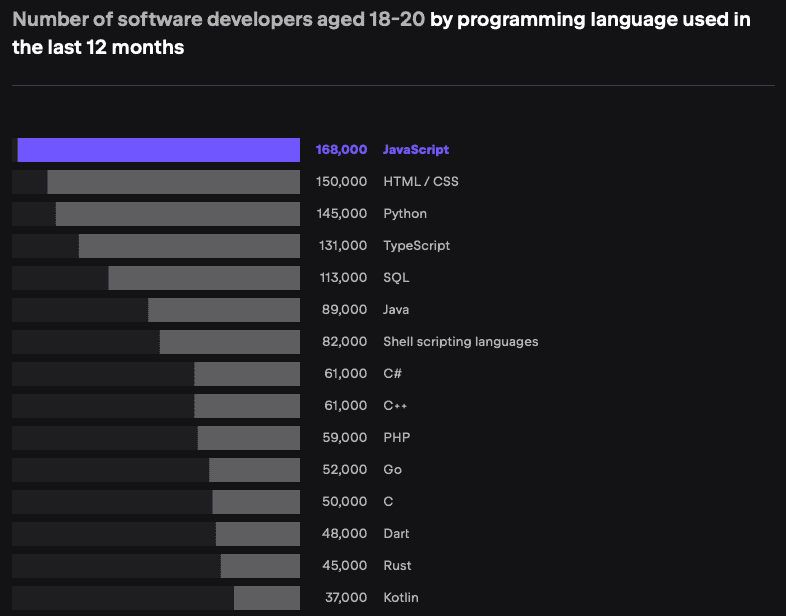
JetBrains: popularity of programming languages among the youngest programmers (18-20 years old).
When we check the youngest reported group of programmers (aged 18-20) we notice that Rust and C go behind PHP, as in this year's group not many people get into a lower level programming. In this age bracket, PHP has more or less the same position as among more experienced programmers, which may indicate that people learning to code do not expect PHP to be less relevant than it is nowadays.
From an educational perspective, the future of PHP seems secure. But let's now change the perspective, and see what people want to use in the future, or at least what they declare:
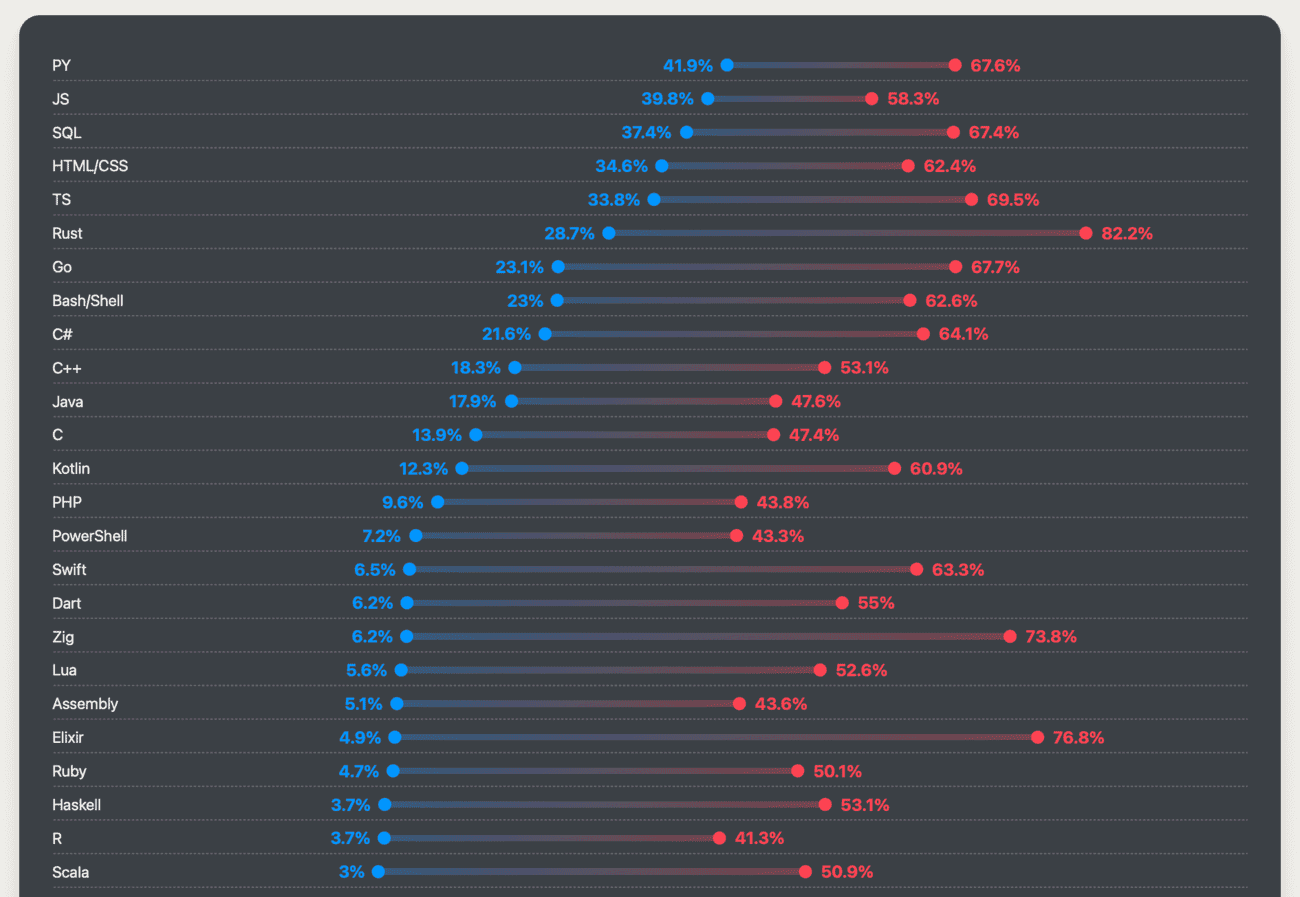
Stack Overflow: desired and admired programming languages.
The authors of the Stack Overflow Developer Survey asked also about personal preferences regarding programming languages and gathered the responses in two groups:
Desired — developers who want to use the technology that they haven't used (did not use it this year, but do want to use it next year).Admired — developers who want to keep using the technology they already use (did use this year, and want to continue using it next year.)
This perspective is way less optimistic for PHP. Only about 10% of people want to try using PHP, and from those who already use it less than half want to continue doing so. But it is worth highlighting two things...
Firstly, and unfortunately, this survey does not go into more detail. Would be nice to see how this differs between PHP developers working with WordPress and those working with modern web development using Symfony or Laravel frameworks. I have a strong belief that the results of admiration would be completely different for these groups.
Secondly, and also unfortunately, PHP PR is not the best. It is considered by many an old-school language, nothing fancy, nothing related to AI, ML or Blockchain. Actually, if I were asked what technologies I would like to try next year, I would list out something related to AI. So nowadays PHP definitely is far from being a desired technology.
Even different perspectives on the future (trends) for programming language are shown IEEE Spectrum report:
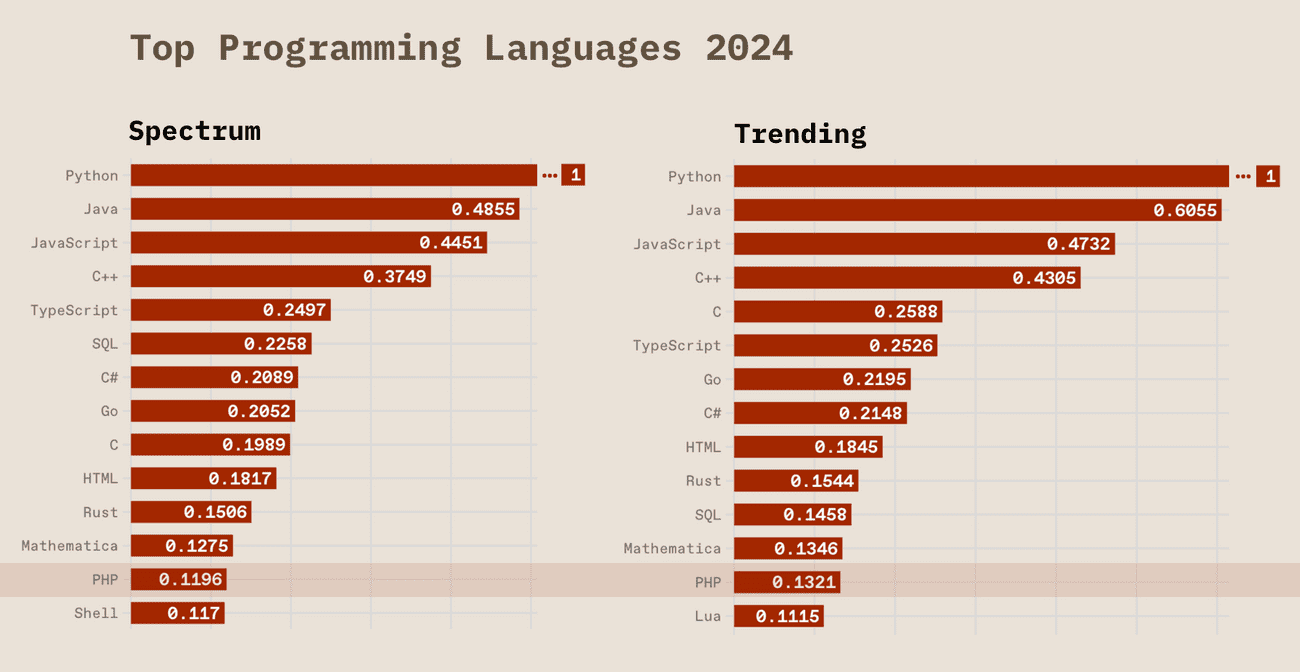
IEEE Spectrum: top programming languages — current (spectrum) vs trending.
According to the IEEE Spectrum report, trends for PHP are a bit better than its current position. And although both charts show that Go is more popular than PHP, the difference between spectrum and trending score is similar for both, so we are not expecting bigger changes between these two languages. Results in IEEE report may differ from other reports, as it does not rely only on surveys, but rather combine many different data sources and many of them are collected automatically.
The last perspective I would like to take is how well PHP developers are compensated. The idea is, that the better the salary, the bigger the incentive for people willing to start their career with this particular technology.
So let's now talk about money...
As mentioned earlier, after analyzing many sites like indeed.com, glassdoor.com or payscale.com I noticed big discrepancies between data sources and markets, so it made no sense to do any meta-study on them. So instead, I focused on our local job market in Poland, as it is something I can easily verify and confirm whether reported salaries match the reality. For ease, prices from our local currevisblency PLN were converted to USD (exchange rate for 17.04.25):
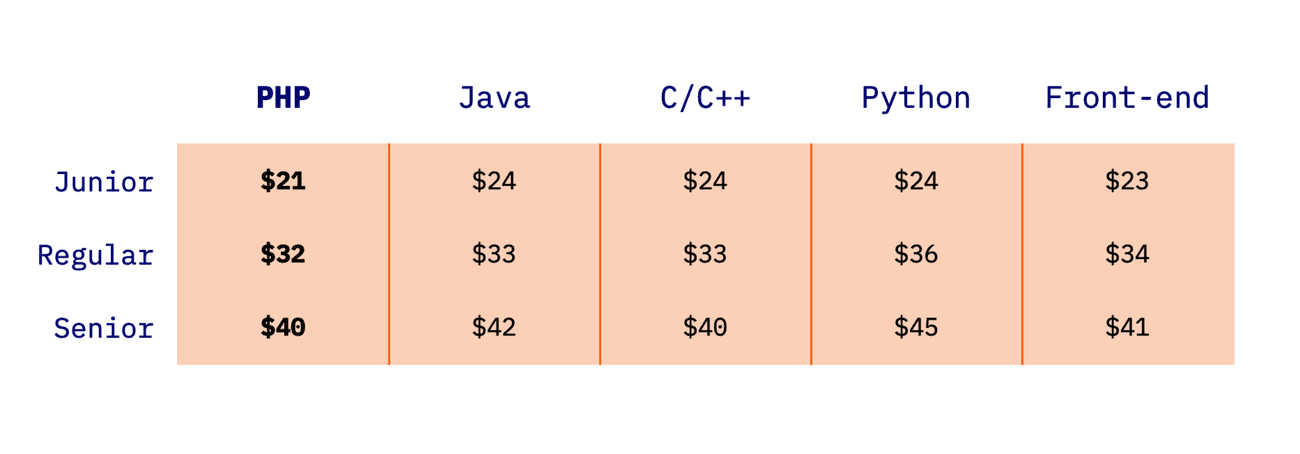
Hays Salary Guide: average hourly rate for IT contractors in Poland.
Based on Hays Salary Guide, PHP developers earn similarly to those coding in C/C++. Front-end and Java developers earn around 5% more. Programmers can expect better salaries when coding in Python, earning around 13% more than PHP developers. It is visible that PHP isn't the best-paid technology, but there are no huge differences in compensation. And still, we have to remember that a PHP developer could be either someone working with WordPress, as well as someone coding enterprise applications in eg. Symfony. Using modern syntax with some modern PHP framework is different from creating PHP-based websites. To create dynamic web pages using Wordpress you don't need to know much about software engineering. So the salary will vary a lot. Eventually, I would say that coding in PHP remains a well-compensated occupation.
Speaking about how broad is the definition of a PHP developer — let's now see how PHP is being used, and whether it does its job well in its niche.
Does PHP do its job well?
Software development is nowadays broader than ever. 30 years ago it was mostly about desktop applications, websites and web apps. The Dotcom boom had its peak in 2000 and after that, we noticed a rapid growth in mobile app popularity. Mobile development and web development with its rich frontend apps required APIs and web services. Then Big Data emerged. And data science, machine learning, IoT, blockchain, AI, LLMs, chatbots and agents. From this perspective, it is clear that PHP's share in the whole software development did shrink. PHP was never meant to be an all-purpose language, it was always a server-side scripting language, created for websites and web applications. So maybe the right question to ask is not about the share PHP holds, but whether it serves its purpose. Whether it does its job well in areas it was designed for.
Website PHP development
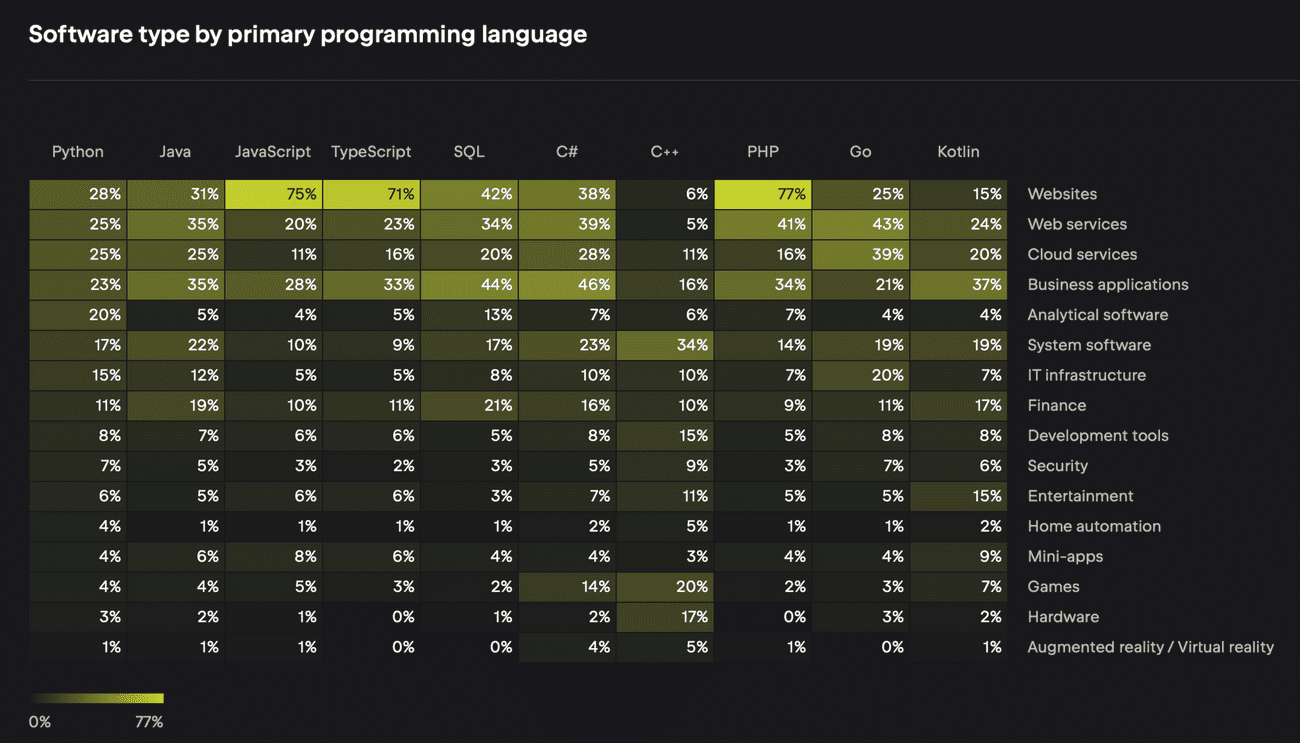
JetBrains — software type by primary programming language.
PHP was a popular technology for building websites 30 years ago, and it is definitely still relevant in this area as of 2025. JetBrains reported that 77% of PHP developers used it to work on websites, that's the highest percentage on the chart. A significant portion of PHP's presence in website development can be attributed to CMS platforms like WordPress, Joomla, and Drupal. With WordPress alone powering over 43% of the web and a plethora of small blogs, it's evident that PHP's legacy as a programming language is intertwined with the success of these platforms.
The server-side use of JavaScript has grown with the rise of headless CMS platforms and static site generators, creating competition for traditional solutions like WordPress in content management. However, these newer options may not fully replace PHP-based systems in the near future.
Recently, I had to choose a CMS for a personal travel project. Despite my company Accesto primarily using JavaScript-based static site generators, I opted for WordPress. The deciding factors were its user-friendly interface, simple setup process, and extensive library of templates and plugins. This allowed me to launch my site within hours.
PHP-powered websites can be created without deep PHP expertise, yet the language is versatile enough for complex software development. If you're considering PHP as your primary web programming language for a SaaS product or other digital solution in 2025, it's worth examining PHP development from a more comprehensive perspective. According to JetBrains, apart from websites (77%), PHP is commonly used to build: web services (41%) and business applications (34%).
Let's now dive a bit deeper into these areas.
Backend PHP web development
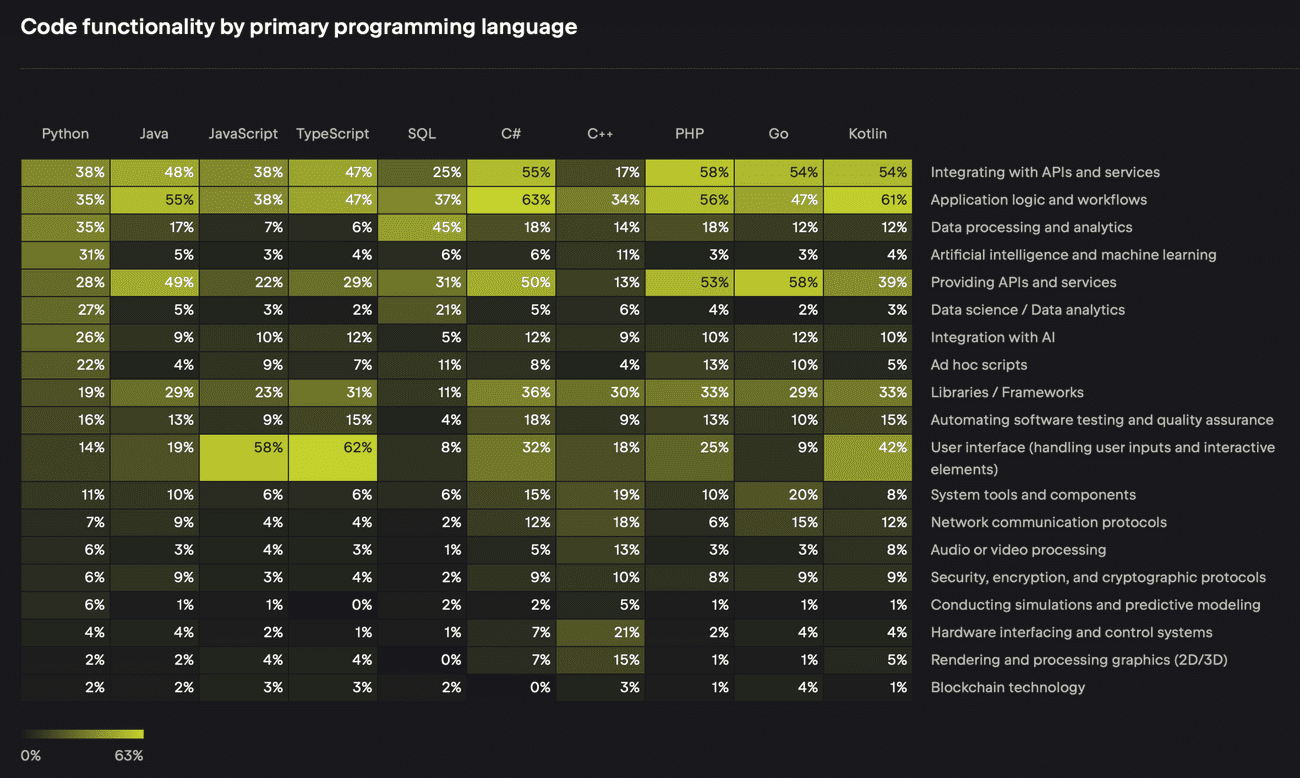
JetBrains — Code functionality by primary programming language.
Based on JetBrains report — PHP plays an important role in 3, quite related to each other, areas:
- application logic and workflows;
- providing APIs and services;
- integrating with APIs and services.
This is also confirmed in Zend's 2025 PHP Landscape Report:
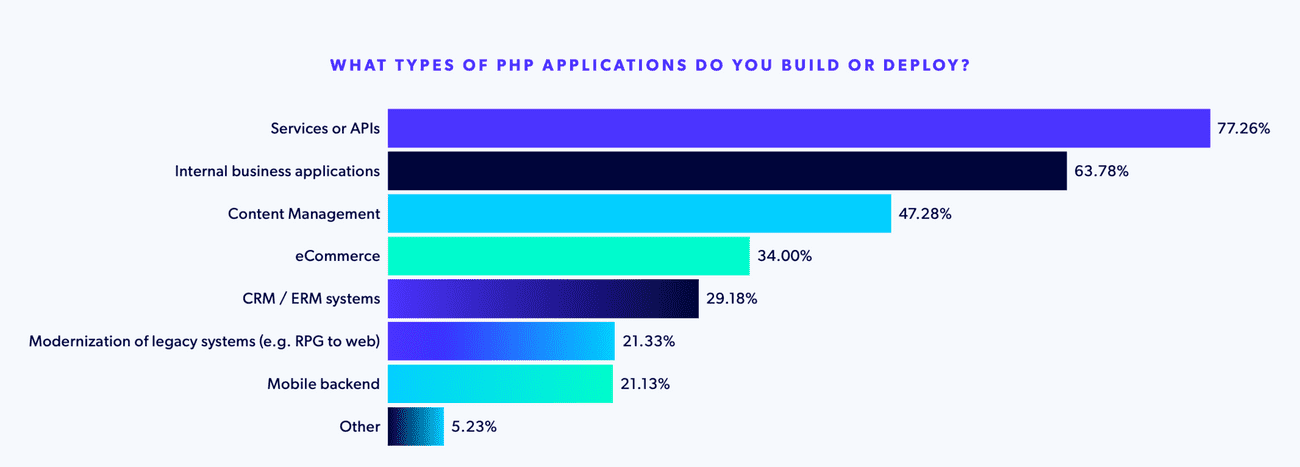
Zend — Types of applications built using PHP.
It is a pretty consistent scope, related to backend web development. When you compare it to Python, you will notice the difference between an all-purpose language and a language like PHP that plays its role in a particular niche. But does it do its job well in this niche? Oh, yes it does!
There's no denying that PHP's continued relevance owes a lot to its powerful frameworks like Laravel and Symfony, with their huge feature set, a predictable and active development process and a great roadmap. They are very stable, secure, and reliable, with long official and community support.
Last year I wrote a blog post on "Why the Symfony LTS version is a perfect choice for your web application?". In that post, I highlight an excellent long-term support of Symfony that lets you sleep tight for 4 years. But just a few months ago it was announced that Symfony in version 5.4 LTS got its support prolonged to 8 years! Yes, EIGHT years of support for one version of the framework. This simply beats any competition. And it is rumored that this will become a new norm also for upcoming Symfony versions.
But long-term support is not all. PHP frameworks allow a great development speed and decent development costs. A perfect choice for modern web development overall. Not just for websites or startup SaaS apps, but also for serious enterprise-level applications.

Zend — security of PHP applications.
PHP is also considered a very secure technology. According to Zend, only 5-6% of developers have doubts about the security of their PHP applications. But there is good news for them — just recently PHP Foundation organized a large security audit of PHP core features.
Role of PHP in Artificial Intelligence and MLL development
According to GitHub's Octoverse report, last year more people than ever joined GitHub. Mostly to work on AI, ML and LLM projects. That's probably the number #1 reason for the increasing popularity of Python recently. In the JetBrains report, we will also notice a substantial percentage of C++ developers reported that they are actively involved in AI and ML. But what about PHP, does it have any role to play in an AI-focused world?
Recently our CTO Michal dedicated one issue of his PHP at Scale newsletter to PHP and AI. So instead of diving too deep into this topic here, really recommend that issue (and a whole newsletter as well). In short — there probably won't be much AI written in PHP, but on the other hand, PHP integrates very well with all the AI solutions. So if you want to add AI features to your SaaS application you don't have to look for other languages. As mentioned in the JetBrains report, PHP is very popular for integrating with APIs and services and building application logic and workflows. And that's exactly what you need to introduce AI features to your web application.
Is PHP as a programming language itself being actively developed?
It is, and the mentioned security audit is not the only sign of it. But how much more you can improve after 30 years of constant development? PHP shows that quite a lot. The last version 8.4 introduced property hooks, asymmetric visibility and array functions. But one thing is language features, another is better security and performance improvements. And speaking of performance. Last month we upgraded PHP for one of our clients from 8.1 to the latest 8.4. Results? Approximately 15-20% performance boost:
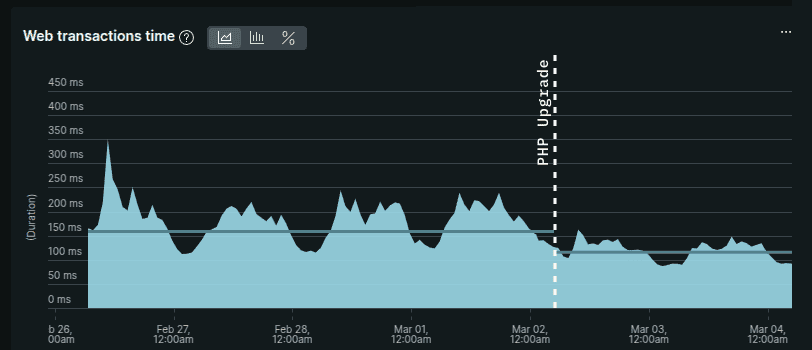
Web transaction time was shortened by 15-20% after upgrading PHP to the latest 8.4 version.
We have already seen some good performance boosts in this project with previous upgrades within version 7 and version 8. So I wasn't really expecting any significant further improvements this time. But PHP managed to surprise me. After 30 years we can still expect some nice gains. Good job to all the core PHP developers! 💪
While statistics from platforms like GitHub show over 500 contributors to PHP's core in the past year, what’s truly remarkable is the nature of these contributions. They aren’t merely bug fixes or minor patches — many are serious enhancements, propelling PHP into the modern age of web development for PHP developers.
Speaking of contributors, 4 years ago, PHP lost one of its most impactful contributors, and the recurring theme of "PHP is dead" became stronger than ever. Was it the fatal hit for the language many had already seen as outdated? On the contrary! It was the catalyst of changes and a chance for a quantum leap. That is how The PHP Foundation was born.
The PHP Foundation was created in 2021 by JetBrains and other industry leaders like Laravel, Zend, Tideways, PrestaShop, and Symfony, just to name a few. Their mission? Securing PHP's future by supporting ongoing development, improving the language, and engaging new and existing contributors. The Foundation's work is already making an impact. They're overhauling the PECL extension system, commissioning mentioned security audits, and improving testing infrastructure and documentation. To learn more, see our recent interview with Roman Pronskiy from The PHP Foundation.
So... is PHP still relevant in 2025?
Although the percentage of developers using PHP dropped to around 17-18%, it doesn't mean that less developers use it. It means that nowadays there are way more developers, and different kinds of developers than in the past.
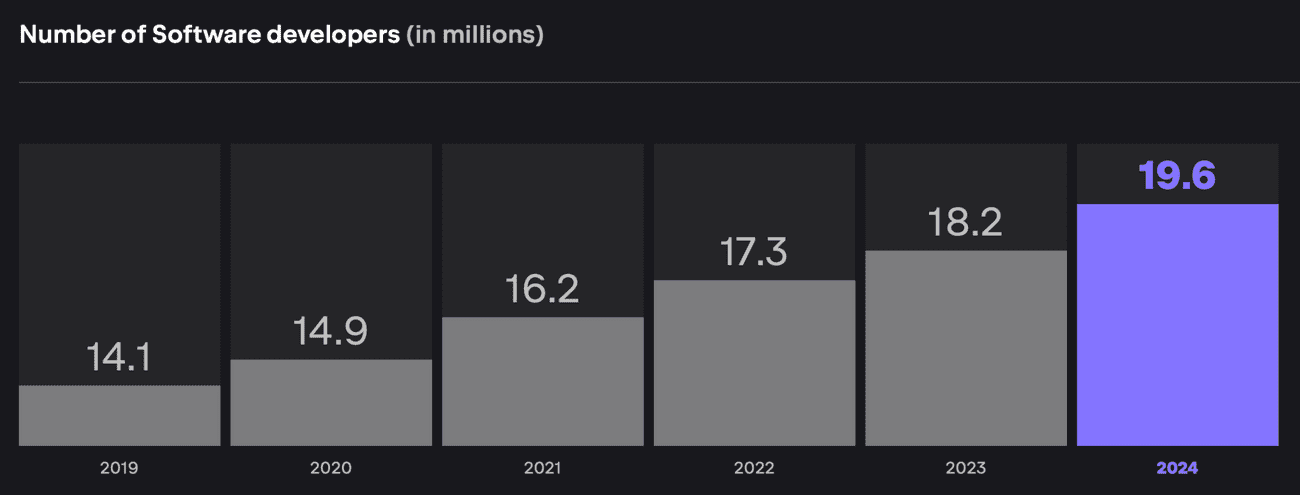
Stack Overflow: Number of software developers in the world.
Software development "cake" is now bigger than ever and has much more flavors. PHP may not be trendy, as it has little to do with AI, big data, data mining, blockchain or LLMs. But calling PHP outdated is an oversimplification and saying it is a dead language is just wrong. PHP was created for a particular purpose, and 30 years later it still fuels websites and web applications well. Web apps, APIs, web services, websites... this is where PHP excels.
PHP was never supposed to be an all-purpose language like Python, so it will never be as popular. But it is definitely relevant in its niche, which is a server-side programming language used as a backend for web applications and websites. It is true to say that in 2025 it still stands out among the most popular programming languages, being used by over 2 million of them around the world as a primary technology, ranking in the top 5 among all the programming languages.
So I would be far from stating that PHP is dead or no longer relevant. Some may think that a programming language that is 30 years old is a finished history. That after so many years we should not expect any new language features. But that's definitely not the case with the PHP! It may not be the first one that introduces various features, but you don't have to be first to be solid, reliable, and thanks to that... relevant. Modern PHP code can be as good as code written in any other language. Personally, I like PHP because after 30 years it can still get better and better.
Technology isn't just about being new; it's about solving problems. PHP might not be the latest, but as long as it addresses needs, it has a secure spot in web development and the PHP community. And thanks to The PHP Foundation, its future seems to be solid.
So, yes, PHP is still relevant in 2025. Period.
And in 2026?
Ok, but what's next? Will PHP be still relevant in 2026?
Those of you who are a bit more senior may remember this page:
Has the large Hadron Collider Destroyed the World yet?
It was created as a joke in response to the recurring question of whether the Large Hadron Collider (opened in 2008) will eventually generate the black hole, that will destroy the world. Spoiler alert — it did not, to this day. I was surprised that this page still exists! Thanks! We still have a reliable place to see if our world still exists 😉
Maybe, I shall do the same with the recurring questions of whether PHP is still relevant?
Darn, it... here it is: https://isPhpStillRelevant.com
You are welcome! You don't have to ask anymore 😉

